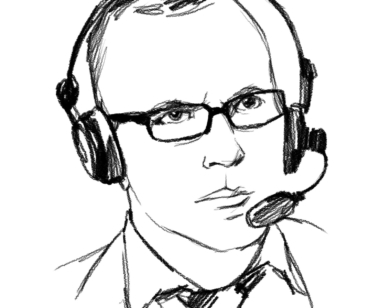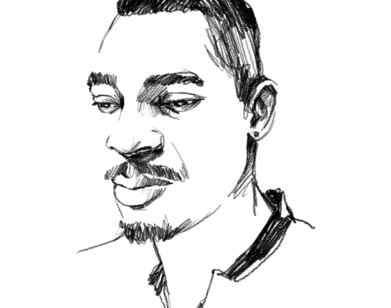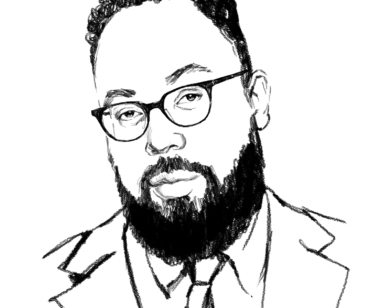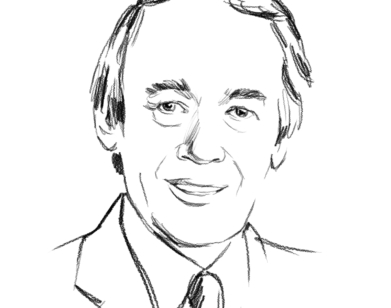ask a sane person
Rebecca Traister Finds Hope In the Mixed-Up-ness of Humanity

A lot of us are angry right now. Luckily, we have Rebecca Traister to tell us we’re not alone. The author and journalist, whose most recent book Good and Mad explored the political power of female anger, has been a consistent voice of rhyme and reason for the culture, with a particular emphasis on the women who disrupt our system for the better (and the men—and women, and systems—who hold them back). In this current moment, which burns with fire in more ways than one, it’s acute critical work like Traister’s that keeps our pot from boiling over.
———
INTERVIEW: Where are you and how long have you been isolating?
REBECCA TRAISTER: I am in (far) northern Maine, on the former potato farm where my mom grew up. I have been here since late May. Before that I was in Brooklyn, where I’ve lived for 23 years, where I was isolating—though it didn’t feel very isolated, with my husband, two small kids, and two cats—since mid-March, when New York shut down.
INTERVIEW: What has this pandemic confirmed or reinforced about your view of society?
TRAISTER: I don’t know that it’s confirmed or reinforced a view so much as it has put so much that’s broken—the country’s health and economic systems, its racism, its sexism, its chasms of inequality—on brightly lit, undeniable display. I hasten to add that, of course, people still deny them, and that stubborn denialism, too, is on display.
INTERVIEW: What has this pandemic altered about your view of society?
TRAISTER: I think the optimistic answer to this is that it’s shown me, in flashes, the capacity for people, even those experiencing their own trauma and challenges, to think outside of themselves and their own experience. I’m referring mostly about the protests this summer, in the midst of the pandemic, and the recognition of so many that they needed to get up, stand, yell, and participate—that the need for change and fury was urgent, and that their participation was required. I didn’t realize that the country was capable of listening in that way, that people were this ready to change minds and opinions. But that optimism comes to me only in flashes because there’s so much else about this time that has shown me how willing people are to revert to comfortable norms that work to reinforce the very inequalities they say they stand against. I read a story about how lots of white people completely swamped Black-owned bookstores with orders for anti-racism books that they then didn’t pick up. I just thought that was the most depressingly apt metaphor for the emptiness of white capitalist commitment—you spend the money or make the gesture, but you don’t do the reading or the work. But I don’t want to dwell entirely there, because a lot of people did pick those books up, and a lot of people are learning and reading and listening and thinking about their own responsibility and complicity for the first time in their lives. I don’t want to pretend that’s not real and important, too. I believe it is.
When it comes to the disease itself, I didn’t realize how much of the population would deny science. (I realize this sounds naïve.) I didn’t anticipate the number of people who would not work for the common good by doing the simplest things—wearing a mask, social distancing, not going to brunch, or whatever. Growing up, I imagined the generations that came before me who endured wars and plagues as having understood in a period of trauma the need for civic responsibility and communal commitment. Some part of me expected—stupidly—that we would be capable of similar communal action. I was really wrong about that, at least for vast segments of the population. I am not surprised by, but never cease to be horrified by, the unwillingness of the federal—and, in many cases, state and local—government to step up and support its people, to do what is within its power to provide economic stability, science, and safety. It’s been a chilling time, but there have been these streaks of real hope and possibility in it, I guess.
INTERVIEW: What is the worst-case scenario for the future?
TRAISTER: The destruction of the planet.
INTERVIEW: What good can come out of this lockdown? Are there any reasons to hope?
TRAISTER: There must always be reasons to hope. If we didn’t have the capacity to hope for better, and to work for better, there would be no point in getting up in the morning. And yes, there are lots of things that could come out of this lockdown, including a broader understanding of our systemic failures and ruptures, an investment—or reinvestment—in acknowledging and working to fix them. We’ll see if we get some of that or not.
INTERVIEW: What has been your daily routine during this time?
TRAISTER: Neither my husband nor I have ever had this experience of working full-time with no school or childcare, so every day is different. We have not mastered a schedule. When we were in Brooklyn, there was a lot of enforced family outdoor time—masked walks and runs in the park, games of catch—sandwiched between periods in which all of us sat inside our fourth-floor apartment and worked at our computers for hours on end. Here, there’s easy access to the outside, so we slam in and out all day, and I know how enormously lucky we are to have access to that level of freedom and space.
INTERVIEW: Describe the current state of your hair?
TRAISTER: It’s long! But it’s been long forever, so it just hangs there.
INTERVIEW: On a scale of 1 to 10, what is your level of panic about the current state of the world?
TRAISTER: 32.
INTERVIEW: Do you think there is hope for true racial equality in the United States? What do you think is the first step in that goal?
TRAISTER: Again, if I didn’t think there was hope, I could not get out of bed in the morning. And the one good thing I can say about the United States is that while its inequities extend back to well before its founding, its nature, laws, and customs have also been subject to revision. I can’t even tell you a “first step”—aside from dispelling with any fantasy that we are in any way “post-racial,” or that previous revisions have done the trick—but I can tell you that those who are committed to working toward a more equal nation are taking steps along a path that others have been on for centuries.
INTERVIEW: How can America work to ensure more equality and justice on a day-to-day level?
TRAISTER: These are enormous questions that I feel wholly incapable of answering in any full way. I just have to acknowledge that. We can fully reimagine the role of government, prioritizing not just the rights but the stability, thriving, and dignity of our people. That means reimagining and rebuilding healthcare (including reproductive healthcare), housing, education, immigration, environmental policy, and policing and incarceration. All those systems and institutions shape the day-to-day lives of millions of people in America, and if we want justice to exist day to day, we need to change the systems. How do we change the systems? That is a process that requires a combination of electoral, legal, legislative, opinion-changing, and protest approaches.
Understandably, I find that the popular desire is for a numbered road map with clear directions for what every person must do in order to fix what’s broken. But in reality, millions of people need to act in millions of different ways, and not just once, not just completing one discreet numbered task. The actions we take are going to be different depending on our communities, our families, our skills, our personalities, and our resources, and they’re going to involve fights—both external and internal—that will last a very long time. The tasks in front of us involve changing laws, our economic system, our own minds, and others’. For some, that will mean protesting and yelling and calling and writing and talking to neighbors and family members. But all of this is going to look different for every different person.
INTERVIEW: Do you think protests are effective tools for changing the system? How does it make a difference in the long term?
TRAISTER: Yes, protest is an effective tool, though not the only tool, and not a complete answer. But it works as a communicative avenue and an early building block for coalition-building and education. Protest lets other people know that anger is shared; it gives shape to demands and words to rage. One of the biggest deterrents to change is the suppression of dissatisfaction, making people who believe things to be maddeningly unjust think that they are alone, that no one agrees with them, that they are crazy or unreasonable. The suppression of righteous and correct anger works to isolate people, keep them apart, and thus discourage them from coming together in their fury and frustration, which can be the beginning of organizing. Protest is one way to make frustration audible and visible, to let those who feel isolated in their dissatisfaction know that they are not alone. For some, the calls of protest will offer a map of possibility; how many people considered this summer, for the first time, that it would even be possible to defund the police? Many, I believe. Those protests played a huge role in the expansion of that imaginative possibility.
INTERVIEW: How do you personally channel your anger? Do you find anger to be a useful emotion?
TRAISTER: A lot of it is in my work, which is in places I’m sure you read. Some of it I channel through physical activity, some of it I suck down and repress like everyone else does, and some of it escapes when I lose my temper at my partner, my kids, or my work.
INTERVIEW: Which young leaders of the moment have inspired you?
TRAISTER: So many first-time candidates, so many who were drawn into electoral politics via protest movements, or their own fury at how broken things are. As far as activists go, it’s the masses of young people who are out on the streets protesting police violence and insisting that Black Lives Matter; it’s the kids who are driving climate work and anti-gun activism. But then again, I’m also inspired by older people who have been at this for decades and are still doing the work.
INTERVIEW: What’s the next step after protests in the streets? Where does the righteous rage go?
TRAISTER: I hope the rage moves in a lot of different directions: into electoral politics, which we’ve already seen and will, I hope, continue; into creative thinking about reform and rebuilding; into legal challenges (made more challenging by the Republican stranglehold on the courts); into teaching; into community work; into organizing workers.
INTERVIEW: Do you work best alone or in a group? Can you protest from home?
TRAISTER: I am a writer, which means that by definition I work best alone. Also, even though I write about activism, and in my work am open about my own politics, I am not an activist. But for those who are working to make the country better, that can take a million varied forms. Fist-in-the-air street protest isn’t for everybody, and so much can be done in other ways: whether you offer your home or logistical help to people who need abortions in places where access has been diminished or eradicated, whether you work to fill community refrigerators or do logistical and legal work to ensure the formerly incarcerated have opportunities and rights, or whether your activism is doing the reading about this nation’s history and its foundational injustices, getting an education that most of us never got in school. History is filled with incredible people who changed the course of their lives to address systemic injustice, and not all of them were leading marches.
INTERVIEW: Americans tend to find the topic of race uncomfortable. How do we start the conversation and address it directly?
TRAISTER: I think it’s mostly white Americans who tend to find the topic uncomfortable, because they (we) have been taught that we have no race. Starting the conversation, I believe, should entail acknowledgment that there is no end to the conversation; it’s not a topic to be tucked away and brought out for periods of curious examination. I’m on the side of relentless acknowledgment for white people. Who cares if it makes us uncomfortable? Discomfort is a daily condition for the majority of the world; why should anyone, especially those who in many cases have been most insulated from it, expect to be exempt?
INTERVIEW: What thinkers have you taken comfort in of late and why?
TRAISTER: Comfort is a weird word, and not entirely apt here, but Ta-Nehisi Coates, Brittney Cooper, Kate Manne, and Adam Serwer come instantly to mind. I am reading Martha Jones’s Vanguard and cannot wait to start Isabel Wilkerson’s Caste. (The Warmth of Other Suns is possibly my favorite non-fiction book I’ve read in the past decade.) I also take comfort in fiction, though I regret to say that I’m one of those people who has had trouble reading during the pandemic, and I don’t know that I’ve ever really had that problem before. For a while, I couldn’t let my brain relax. I’m just now really lost in the middle of a novel, and it feels glorious.
INTERVIEW: Where did we go wrong? Like, what was the exact moment?
TRAISTER: 2016? Shelby? Bush v. Gore? Clarence Thomas’s confirmation? 1619? It’s so hard to pick a single, defining fuck-up.
INTERVIEW: If you could stop time at one particular moment in your life, which moment would it be?
TRAISTER: Agh, this is ghoulish! I wouldn’t want to stop time because that’s like death. And the thing is, I really love life.
INTERVIEW: What’s one skill we should all learn while in quarantine?
TRAISTER: There are the big answers to this: We should all learn to manage our anxieties, think outside of ourselves, and make conscious decisions about how to distribute what resources we have in abundance but that others lack. Then, there are the small: sourdough! I’ll go with the small: I have learned to make a great pie crust, and I’m grateful every time I put it to use.
INTERVIEW: What does our future as a nation look like?
TRAISTER: That is entirely up to all of us and the choices we make—not just right now, not just in November, but for the rest of our lives.
INTERVIEW: What prevents you from giving up hope in the human race?
TRAISTER: I don’t always have hope. But when I do, I think about how, when my elder daughter was a toddler, my husband used to read her a book called The Fire Cat, which he’d loved as a child. And the thing about Pickles the Fire Cat was that he was not a good cat, and he was not a bad cat. He was a good and bad cat, a bad and good cat. He was a mixed-up cat. That’s how I feel about the human race. It’s that mixed-up-ness, not some set or overriding predisposition toward bad or good, that permits me hope.
INTERVIEW: Who should be the next president of the United States?
TRAISTER: Given the choices in front of us, there is simply no question: Joe Biden.






